George Brandis's new spying laws will include measure to criminalise media reporting of Snowden-style leaks
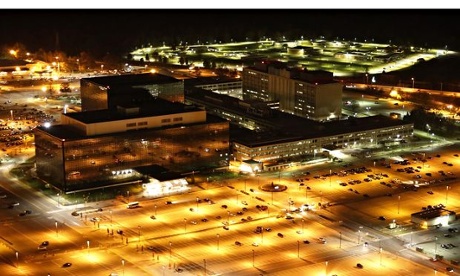 Edward Snowden's NSA leaks have prompted a crackdown by the Australian attorney general on the reporting of 'special intelligence operations'. Photograph: Trevor Paglen/REX
Edward Snowden's NSA leaks have prompted a crackdown by the Australian attorney general on the reporting of 'special intelligence operations'. Photograph: Trevor Paglen/REX
Australian journalists could face prosecution and jail for reporting Snowden-style revelations about certain spy operations, in an “outrageous” expansion of the government’s national security powers, leading criminal lawyers have warned.
A bill presented to parliament on Wednesday by the attorney general, George Brandis, would expand the powers of the Australian Security Intelligence Organisation (ASIO), including creation of a new offence punishable by five years in jail for “any person” who disclosed information relating to “special intelligence operations”.
The person would be liable for a 10-year term if the disclosure would “endanger the health or safety of any person or prejudice the effective conduct of a special intelligence operation”.
Special intelligence operations are a new type of operation in which intelligence officers receive immunity from liability or prosecution where they may need to engage in conduct that would be otherwise unlawful.
The bill also creates new offences that only apply to current and former intelligence operatives and contractors in a move which appeared to directly address the risk of documentary disclosures being made following revelations by the US National Security Agency whistle-blower Edward Snowden – whom Brandis has previously labelled a “traitor”.
On Thursday Brandis dismissed suggestions he was specifically going after journalists who reported information.
"No we're not and I think there has been a little bit of erroneous commentary on that provision," Brandis told the ABC.
"It's designed to plug a gap in the existing legislation. Under the existing legislation it's a criminal offence for an officer of a national security agency to disclose intelligence material to a third party, but it's not an offence for an officer to copy or wrongfully remove that material.
"In other words, communication with a third party is an element of the current offence but it seems to us that it should be wrong and it should be an offence to illicitly remove intelligence material from an agency. That's all that's about."
But the leading criminal barrister and Australian Lawyers Alliance spokesman Greg Barns said a separate provision in the “troubling” legislation could be used to prosecute and jail journalists who reported on information they received about special intelligence operations.
The offences relating to the unauthorised disclosure of information are outlined in section 35P of the national security legislation amendment bill, which was presented to the Senate on Wednesday and is set to face parliamentary debate after the winter recess.
The explanatory memorandum to the bill said the offence applied to “disclosures by any person, including participants in an SIO [special intelligence operation], other persons to whom information about an SIO has been communicated in an official capacity, and persons who are the recipients of an unauthorised disclosure of information, should they engage in any subsequent disclosure”.
Barns said: “I thought the Snowden clause [in the bill] was bad enough but this takes the Snowden clause and makes it a Snowden/Assange/Guardian/New York Times clause.”
“It’s an unprecedented clause which would capture the likes of Wikileaks, the Guardian, the New York Times, and any other media organisation that reports on such material.”
Barns, who has worked on terrorism cases and has also advised Wikileaks, said ASIO could secretly declare many future cases to be special intelligence operations. This would trigger the option to prosecute journalists who subsequently discover and report on aspects of those operations.
He said it would be easy for ASIO to declare special intelligence operations because it simply required the security director-general or deputy director-general to approve.
“Their own boss says, ‘I think we better call this a special intelligence operation, don’t you?’ ‘Yes, sir,’ close it down. The more you talk about it the more outrageous it becomes,” Barns said.
Barns said operations in which ASIO officers broke laws were the very ones that the community may regard as abuses of power. He argued Brandis wanted powers not available to governments in the UK and the US where citizens enjoyed greater protections for freedom of speech.
“In Australia we lack that fundamental human rights protection and therefore Brandis can get away with inserting a clause into a bill which you wouldn’t be able to do in the UK or in the US,” Barns said.
“It’s the sort of clause you’d expect to see in Russia or in China and in other authoritarian states but you don’t expect to see it in a democracy. I hope the Senate rejects it because it takes the law further than in jurisdictions which are similar to Australia.”
Leading criminal law barrister Shane Prince said the new offences relating to special operations were “quite draconian”.
“The five-year offence would seem to be able to apply even if the person had no idea about the special intelligence operation and they happened to release information which coincidentally was part of or related to the special intelligence operation,” he said.
“Add on to that the fact you probably in a trial wouldn’t be able to know what the special intelligence operation was about, would mean that you could have the situation where a person could be on trial for disclosing information which they say is related to a special intelligence operation, even if the person didn’t know that the information related to a special intelligence operation and they would never get to know in their trial.”
The Greens senator Scott Ludlam said the new offence could criminalise the actions of journalists. “I can’t see anything that conditions it or carves out any public interest disclosures. I can’t see anything that would protect journalists,” he said.
Electronic Frontiers Australia chief executive Jon Lawrence said the clause covering security personnel “appears to be a clear attempt to stamp down on whistle-blowers to avoid an Australian Ed Snowden.
“The fact that they’re making that illegal doesn’t necessarily stop a whistle-blower though I think in the general context of what is a pretty extreme crackdown on whistle-blowers generally.”
The amendments would explicitly bring private contractors under the definition of intelligence operatives to make them subject to prosecution, and include any person “performing functions or services for the organisations in accordance with a contract, agreement or other arrangement”.
The new penalties criminalise copying, transcribing, retaining or recording intelligence material in any way, and carry a maximum penalty of three years. Evidence of disclosure is not required for these penalties.
Brandis said this measure filled a gap in existing legislation whereby it was not unlawful for an officer of ASIO to illicitly copy or remove material from ASIO. He said it was already an offence for officers to disclose confidential information to a third party, punishable by up to two years in jail, and that penalty would increase to 10 years.
The president of the NSW Council for Civil Liberties, Stephen Blanks, said the penalties raised serious concerns.
“When things go awry total secrecy is not desirable. When something is seriously awry whistle-blowers play a vital role in the provision of good governance. The recent case relating to East Timor has thrown some light on this balance in Australia.”
The bill is the first element of the government’s planned national security reforms, with further changes set to target the risk posed by Australians who fight in Syria and Iraq and then return home.
Independent MP Andrew Wilkie, a former intelligence analyst, said on Wednesday it was important for intelligence officers to be able to make public interest disclosures. Australia’s whistle-blower legislation leaves a narrow window for disclosure of intelligence information.
“It must be accompanied by protection for intelligence officials who copy and disseminate material in the public interest,” Wilkie said.
Brandis referred the bill to the parliamentary joint committee on intelligence and security for a report by September, when MPs are set to debate the law.
Photo: Joe Hockey is having a hard time getting his budget measures through the Senate (AAP: Alan Porritt)

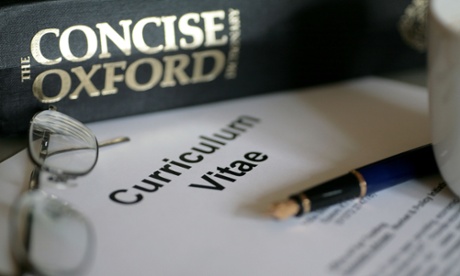 ‘Bogus applications are already part of the deal. Photograph: Gary Roebuck/Alamy
‘Bogus applications are already part of the deal. Photograph: Gary Roebuck/Alamy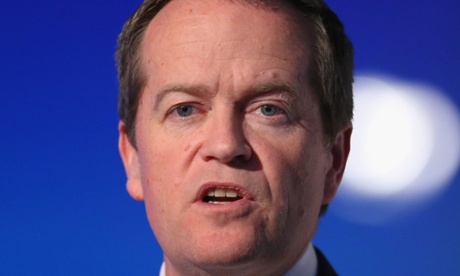 Bill Shorten made the comments in a strongly worded speech to the party's NSW conference. Photograph: Scott Barbour/Getty Images
Bill Shorten made the comments in a strongly worded speech to the party's NSW conference. Photograph: Scott Barbour/Getty Images
 Photo: Bill Shorten urged delegates to prepare to fight for education and health (AAP: Nikki Short)
Photo: Bill Shorten urged delegates to prepare to fight for education and health (AAP: Nikki Short) 


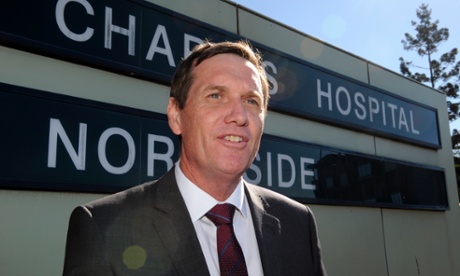 Dr Anthony Lynham secured 61.5% of the vote after preferences in Stafford. Photograph: Dan Peled/AAP
Dr Anthony Lynham secured 61.5% of the vote after preferences in Stafford. Photograph: Dan Peled/AAP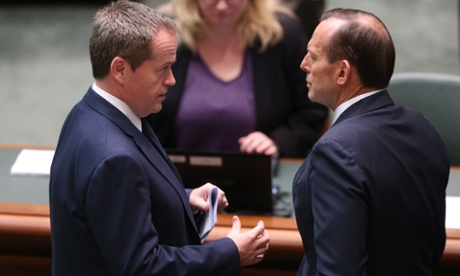 Opposition leader Bill Shorten maintains a five-point lead over Tony Abbott as preferred prime minister. Photograph: Mike Bowers for the Guardian
Opposition leader Bill Shorten maintains a five-point lead over Tony Abbott as preferred prime minister. Photograph: Mike Bowers for the Guardian Edward Snowden's NSA leaks have prompted a crackdown by the Australian attorney general on the reporting of 'special intelligence operations'. Photograph: Trevor Paglen/REX
Edward Snowden's NSA leaks have prompted a crackdown by the Australian attorney general on the reporting of 'special intelligence operations'. Photograph: Trevor Paglen/REX

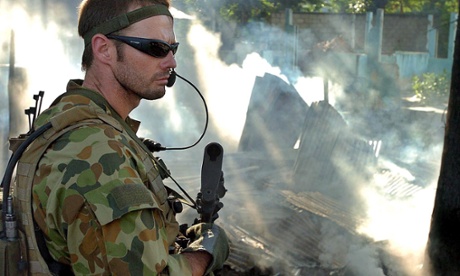 'Our current Defence Act does not allow for any level of transparent decision making.' Photograph: EPA
'Our current Defence Act does not allow for any level of transparent decision making.' Photograph: EPA Photo: Many budget savings proposals by the Government have been blocked in the Senate. (AAP)
Photo: Many budget savings proposals by the Government have been blocked in the Senate. (AAP) 



